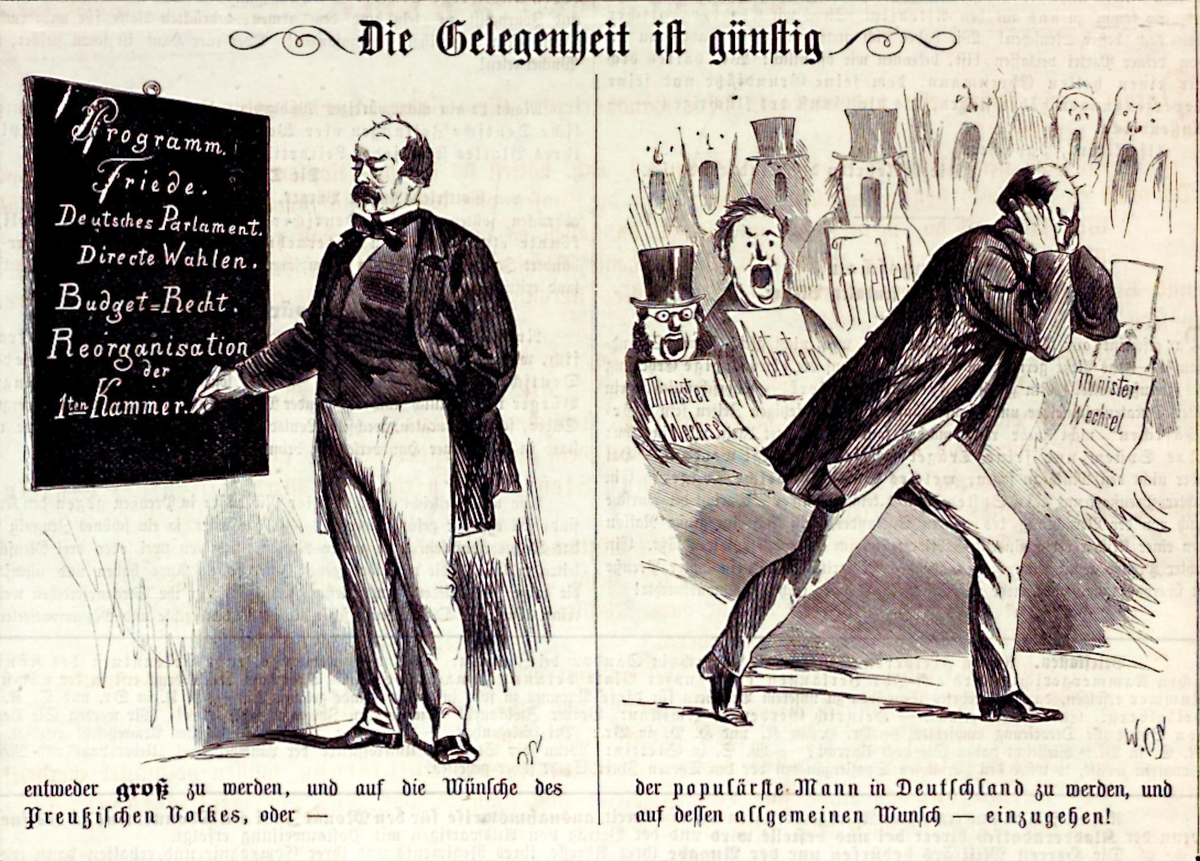Source

Source: Wilhelm Scholz, “Die Gelegenheit ist günstig” [“The
Opportunity is Favorable”],
Kladderadatsch, vol. 19, no. 25, June
3, 1866, p. 100. Available online at: UB Heidelberg, Digital
Library,
https://doi.org/10.11588/diglit.2248#0102
This cartoon by Wilhelm Scholz (1824–1893) was published in the satirical journal Kladderadatsch less than two weeks before the outbreak of the Austro-Prussian War of 1866. The cartoon is divided into two halves, each of which has its own caption. Together, the title and the two captions read: “The opportunity is favorable, either to become great and respond to the wishes of the Prussian people, or—to become the most popular man in Germany by acceding to their general wishes!” At the left, Bismarck uses a chalkboard to outline a plan for achieving the first of these two options: becoming “great” and responding to public opinion in Prussia. His plan [Programm] includes preserving peace [Friede]; instituting a national parliament based on the direct, rather than indirect, election of deputies [Deutsches Parlament. Directe Wahlen]; agreeing that the Prussian House of Deputies has the right to approve state budgets [Budget-Recht]; and reforming the Prussian House of Lords [Reorganisation der 1ten Kammer]. At the right, Scholz suggests that Bismarck could achieve the second option—becoming “the most popular man in Germany”—by much simpler means: all he needs to do is resign! Here, Bismarck is shown covering his ears with his hands and fleeing an angry mob. Two members of the mob hold signs demanding a change of ministers [Minister Wechsel]; another asks for Bismarck to step down [Abtreten], and yet another calls for peace [Friede]. By using the German infinitive “eingehen” in the caption below this image, Scholz introduces an important pun that adds to the impact of the cartoon. While this verb can mean “to accede to” or “respond to” [as in “accede to the wishes of the people,” the verb’s primary meaning here], it can also be translated as “perish” or “die.” In this case, the second meaning is equally apt—for at the time of the cartoon’s publication most observers in central Europe believed that Bismarck’s term as minister president of Prussia would not survive what they expected to be a Prussian defeat at the hands of Austria and its allies. Prussia’s momentous victory at the Battle of Königgrätz on July 3, 1866, proved them wrong.

Source: Wilhelm Scholz, “Die Gelegenheit ist günstig” [“The
Opportunity is Favorable”],
Kladderadatsch, vol. 19, no. 25, June
3, 1866, p. 100. Available online at: UB Heidelberg, Digital
Library,
https://doi.org/10.11588/diglit.2248#0102